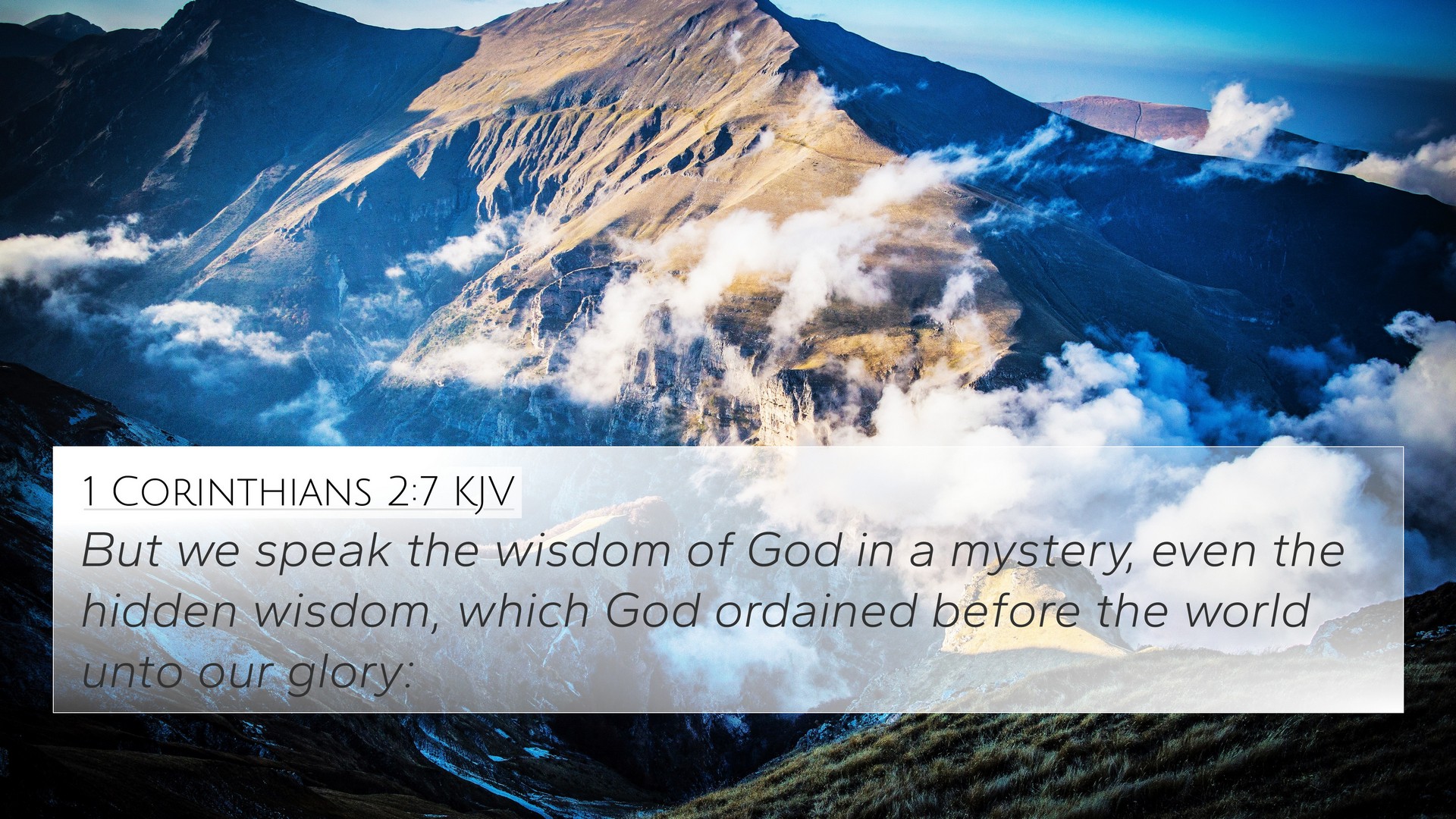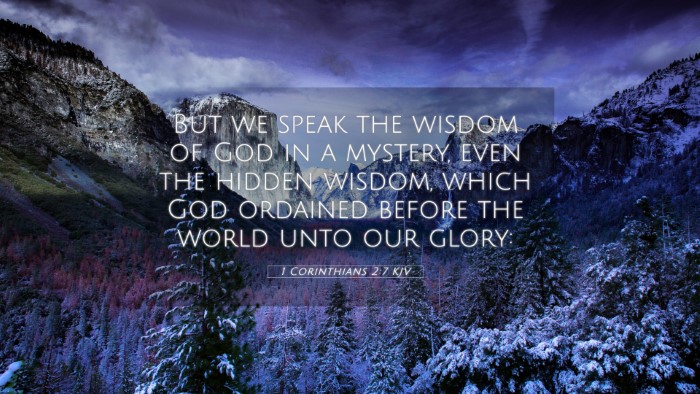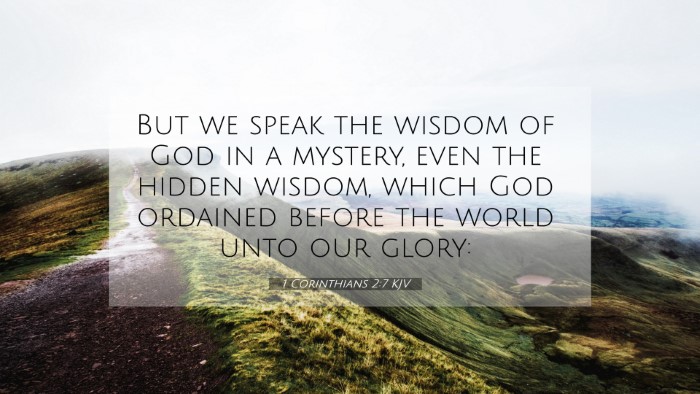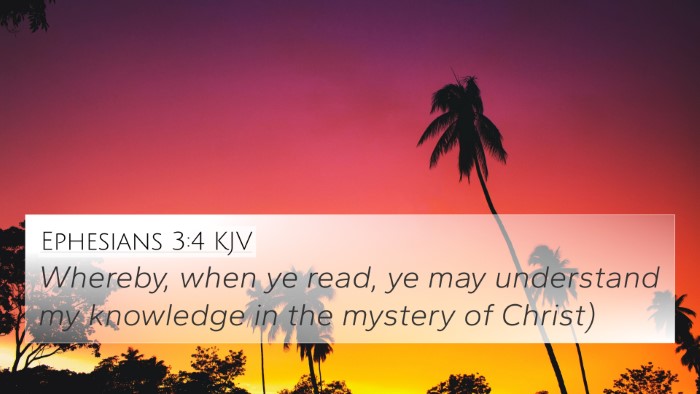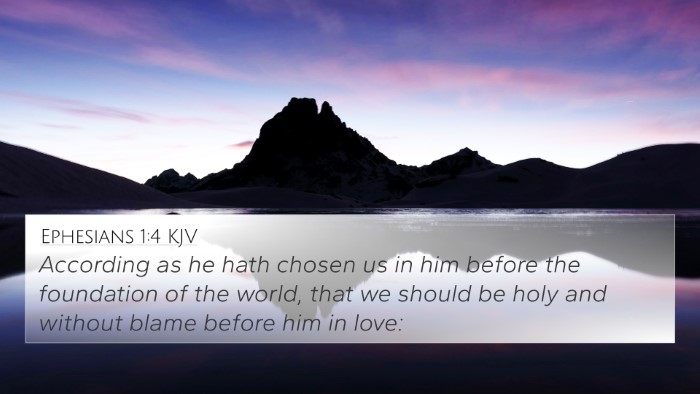Understanding 1 Corinthians 2:7
The Apostle Paul, in his letter to the Corinthians, provides a profound insight into the wisdom of God as it relates to spiritual truths in 1 Corinthians 2:7. This verse emphasizes the divine mystery revealed through Jesus Christ, contrasting it with worldly wisdom. Below is a comprehensive exploration of this scripture, utilizing public domain commentaries to present a cohesive understanding.
Verse Analysis
1 Corinthians 2:7 (KJV): "But we speak the wisdom of God in a mystery, even the hidden wisdom, which God ordained before the world unto our glory."
Key Themes
- Divine Wisdom
- Spiritual Revelation
- God’s Purpose
- Mystery in Faith
Interpretation and Insights
According to Matthew Henry, this verse indicates that the wisdom imparted by God is not easily understood by the natural man. Henry elaborates that the hidden wisdom refers to truths that were not fully disclosed until Christ revealed them through His life, death, and resurrection. This divine wisdom serves a purpose entwined with human salvation and glorification.
Albert Barnes expands on this notion by pointing out that the wisdom of God contrasts sharply with the wisdom of the world. He notes that the world fails to recognize the reality of God's wisdom, which is often cloaked in mystery, yet fundamentally significant for believers' understanding of their salvation and purpose.
In his commentary, Adam Clarke emphasizes that the wisdom mentioned here was predestined for the glory of believers. Clarke underscores that this wisdom, previously hidden, is made known to those who accept Christ, thereby illustrating how the gospel reveals divine truths, fostering a deeper faith and comprehension of God's plan.
Cross-References for Further Study
This verse connects with several other scriptures that highlight the theme of divine wisdom and revelation:
- Romans 16:25-26: This passage speaks of the revelation of the mystery kept secret since the world began, echoing the themes of hidden wisdom.
- Ephesians 1:9-10: Paul writes about the mystery of His will, which He purposed in Christ, reinforcing the idea of a divine plan unveiled in Jesus.
- Colossians 1:26-27: Here, Paul's assertion that the mystery is Christ in you, the hope of glory, aligns with the revelation theme of 1 Corinthians 2:7.
- 1 Peter 1:20: This verse speaks about Christ being foreordained before the foundation of the world, strengthening the belief in God's predetermined wisdom.
- John 1:1-5: The Word being with God and being God aligns with the concept of divine revelation, emphasizing the wisdom embodied in Christ.
- Proverbs 8:22-31: These verses poetically depict wisdom as being present with God at creation, supporting the profound nature of divine wisdom.
- Isaiah 55:8-9: "For my thoughts are not your thoughts," reflects the contrast between human and divine wisdom referenced in 1 Corinthians 2:7.
Thematic Connections and Additional Insights
The examination of this verse and its cross-references highlights a significant inter-Biblical dialogue regarding the understanding of God's wisdom. The scriptures consistently reveal that God’s wisdom operates beyond human comprehension, often presenting itself through the mysteries of faith.
Furthermore, the linked verses demonstrate how Paul’s epistles frequently address the relationship between divine wisdom and Christian living, challenging believers to embrace a perspective that prioritizes spiritual understanding over worldly perceptions.
Study Tools and Methods
For those engaged in cross-referencing Bible verses, several tools can enhance understanding:
- Bible Concordance: Helps locate verses and themes systematically.
- Bible Cross-Reference Guide: Provides thematic links across different books of the Bible.
- Cross-Reference Bible Study: Encourages methods for exploring related scriptures for deeper insights.
- Bible Reference Resources: Access to dictionaries, commentaries, and thematic studies.
Conclusion
In closing, 1 Corinthians 2:7 invites readers into a deeper contemplation of God’s hidden wisdom, illustrating the importance of recognizing divine truth as revealed in Jesus Christ. The connections drawn between this verse and other scriptural references help to illuminate the overarching narrative of grace, purpose, and the continuous revelation of God’s plan to humanity.
